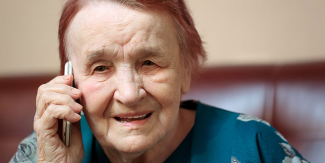
In times of great pressure comes great innovation. Unfortunately, not all new ideas are used for good. The perfect time for scammers to strike is when people are most vulnerable. The situation that is unfolding with COVID-19 has put the entire world in a place of vulnerability, and scammers want to take advantage of all the uncertainly surrounding this situation.
Seniors are especially susceptible to scams due to their trusting nature and not wanting to be impolite. Many scammers expect adults of this generation to be financially stable and to have excellent credit. Often seniors feel embarrassed about being scammed or can’t remember important details and so they rarely report fraudulent activity.
To help keep you safe from scams, we have compiled the following list of tips and warning signs for you to look out for:
- Calls, emails, or other communications claiming to be from the Treasury Department and offering COVID-19 related grants or stimulus payments in exchange for personal financial information, or an advance fee, or charge of any kind
- People or organizations claiming they have a cure or vaccine for COVID-19 or vitamins to help improve your immunity
- Stock in companies that supposedly have a cure or vaccine for COVID-19
- A call or email from the Center for Disease Control (CDC), World Health Organization (WHO), Medicare, or Medicaid offering free test kits if you pay for shipping and handling. This is meant to get your credit card information and address.
- Businesses offering hand sanitizer or masks for a fee
- Store closure sales offering major discounts
- Charities to help people or companies effected by COVID-19 or to help fund disease research
Avoid giving out any personal information, credit card information, or your date of birth to an unsolicited caller. Do not click on any links or download files from emails of an unknown source. If you would like to donate to any charities during this time, it would be best to donate to a reputable charity that was well established before the pandemic. If you are unsure about a suspicious phone call or email, ask another member of your family. Find up-to-date and accurate information regarding COVID-19 from the U.S. Centers for Disease Control and Prevention (CDC), World Health Organization (WHO), or the Wisconsin Department of Health (DHS).
If you suspect that you have been a victim of a possible scam, you can file a complaint with the Department of Agriculture, Trade and Consumer Protection (DATCP) at DATCPHotline@wisconsin.gov, through their toll-free hotline at (800) 422-7128, or online.
Resources
“Coronavirus Scams Spread as Fraudsters Follow the Headlines” (AARP, 3/9/2020)
FBI.gov guidance and resources related to COVID-19
Story by Erin Chin
- Log in to post comments



